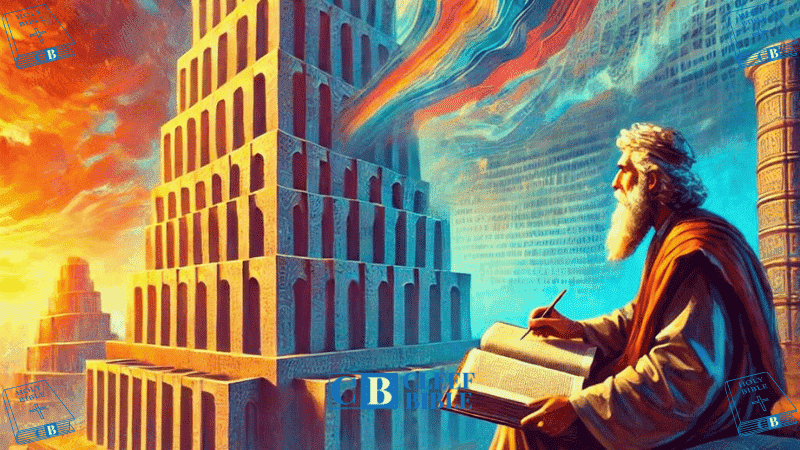Have you ever wondered why we speak so many different languages around the world?
The story of the Tower of Babel offers us a fascinating answer to this question from a biblical perspective.
This ancient narrative, found in Genesis 11:1-9, not only explains the origin of diverse languages, but also teaches us profound lessons about unity, human pride, and God's sovereignty.
Objective of the Article
The purpose of this article is to explore in detail the history of the Tower of Babel, its historical and biblical context, and the theological and cultural interpretations that have been derived from it.
In addition, we will analyze the moral and spiritual implications this narrative has for us today.
Historical and Biblical Context

To better understand the history of the Tower of Babel and its context in the Bible, it is essential to explore its temporal location, the state of the ancient world after the Flood, and the meaning of the name “Babel.”
Here I explain in detail some of the most important aspects:
Temporal Location in the Bible
The story of the Tower of Babel is found in the book of Genesis, the first book of the Bible.
This narrative is set in time after the Flood, a catastrophic event that God used to judge humanity's wickedness.
After the Flood, Noah and his family repopulated the earth, and humanity began to grow again.
Here I explain how this temporary placement develops:
1. Chronological sequence in Genesis
The Tower of Babel appears in Genesis 11, after the narrative of the flood in Genesis 6-9 and the genealogy of Noah in Genesis 10.
This location indicates that the story of Babel takes place at a time when humanity had already multiplied and spread again over the earth.
The chronological sequence underlines the continuity of God's plan for humanity after the judgment of the flood.
2. Post-Flood context
After the flood, the earth was being repopulated by Noah's descendants, who spread out and formed new communities.
This post-Flood context is crucial to understanding the initial unification of humanity in a single language and purpose, which led to the construction of the Tower of Babel.
The desire to build a city and a tower reflects humanity's attempt at centralization and self-preservation.
3. Divine purpose of dispersion
God had instructed Noah and his sons to multiply and fill the earth, a mandate that required dispersion and expansion.
The construction of the Tower of Babel, on the other hand, represented an attempt to contradict this divine purpose, seeking centralization rather than dispersion.
The story of Babel highlights the importance of obeying God's command to fill the earth and not attempting to thwart God's plans.
The Ancient World After the Flood
After the Flood, humanity lived in relative unity.
They all shared the same language and the same purpose.
This cohesion allowed them to collaborate effectively, but also led them to challenge God in a significant way.
Here I explain how the ancient world developed after the flood:
1. Linguistic and cultural unity
Humanity shared a single language, which facilitated communication and cooperation in their common endeavors.
This linguistic unity reflected a cultural cohesion that allowed people to work together efficiently on large projects, such as the construction of the Tower of Babel.
The story of Babel shows how this unity was used for a purpose that ultimately challenged God's authority.
2. Effective collaboration
The ability to work together on a project as ambitious as the Tower of Babel demonstrates the effectiveness of human collaboration when there is unity of purpose and communication.
However, this collaboration was directed toward building a tower “that reaches the sky” to make a name for themselves, indicating a defiant pride and self-sufficiency.
The narrative highlights how collaboration can be powerful, but also how it can be diverted for purposes that go against God's will.
3. Challenge to divine authority
The attempt to build the Tower of Babel symbolized a direct challenge to God's authority, as the builders wanted to make a name for themselves and avoid being scattered.
This challenge shows the human tendency toward pride and self-sufficiency, and how these can lead to actions that contravene divine commands.
God's response, confusing their languages and scattering them all, underscores his sovereignty and the fulfillment of his purpose to fill the earth.
Meaning of the Name “Babel”
The name “Babel” has a double connotation.
In Hebrew, “Babel” means “confusion,” which refers to the final outcome of history.
However, it is also associated with Babylon, an ancient city known for its greatness and, later, its opposition to God.
Here I explain how the meaning of the name “Babel” develops:
1. Connotation of confusion
The term “Babel” in Hebrew is associated with the confusion of languages that God imposed to disperse humanity.
This confusion was a divine judgment on human centralization and pride, resulting in the dispersion and diversification of languages and cultures.
The name “Babel” thus becomes a symbol of the confusion and division that arises when humanity challenges God.
2. Relationship with Babylon
Babel is also linked to Babylon, a city that later became a symbol of opulence, power, and opposition to God in the Bible.
Babylon is mentioned in several biblical books as a place of exile for the Israelites and a symbol of resistance against divine rule.
The relationship between Babel and Babylon underscores a continuing theme in the Bible about the struggle between God's sovereignty and human rebellion.
3. Lesson on self-reliance and pride
The meaning of the name “Babel” teaches us about the dangers of self-sufficiency and pride that lead humanity to defy God.
The resulting confusion and dispersion reflect the consequences of attempting to live independently of God's will.
This lesson is relevant today, reminding us of the importance of humility and obedience to God in all our endeavors.
We can appreciate the depth and significance of the temporal location of the Tower of Babel in the Bible, the state of the ancient world after the Flood, and the meaning of the name “Babel.”
These aspects underline the narrative about human unity and collaboration, as well as the dangers of pride and self-sufficiency, demonstrating that the trust in God and obedience are fundamental to living a full and meaningful life.
Analysis of Genesis 11:1-9

To fully understand the story of the Tower of Babel in the Bible, it is crucial to analyze each verse and its meaning.
Here I explain in detail each part of the story:
Verse by Verse
Genesis 11:1-2: One People and One Language
“Then the whole earth had one language and the same words.
And it came to pass, as they journeyed from the east, that they found a plain in the land of Shinar, and they dwelt there.”
These verses show us a humanity united not only by its language, but also by its purpose.
The land of Shinar, which corresponds to the region of Mesopotamia, becomes the stage for his great enterprise.
Here I explain how this linguistic and geographical unity influences your project:
1. Unity of purpose:
All humanity shared a single language, which facilitated communication and collaboration on common projects.
This unity allowed people to work efficiently and in a coordinated manner, which is crucial for building a city and a monumental tower.
Linguistic unity symbolizes the human capacity to achieve great things when united, but it also highlights the danger of collective arrogance.
2. Location in Sinar:
The plain of Shinar in Mesopotamia was an ideal place for construction because of its fertile, flat terrain.
This region becomes the center of the action, providing a backdrop for humanity's attempt to reach the sky with its tower.
The choice of this location underscores the desire to establish a center of power and culture that symbolizes human ambition.
Genesis 11:3: The Decision to Build a City and a Tower
“And they said to one another, Come, let us make brick, and bake it with fire.
And brick served them instead of stone, and asphalt instead of mortar.”
The decision to build a city and a tower is a symbol of human ambition.
The use of bricks and asphalt shows a significant technological advancement for the time, but also indicates a reliance on one's own skill rather than divine provision.
Here I explain the key elements of this decision:
1. Technological innovation:
The use of baked bricks and asphalt demonstrates human ingenuity and its ability to innovate in construction.
This technological advancement allowed for the creation of larger, more durable structures, reflecting humanity's ambition to leave a lasting mark.
However, this innovation also symbolizes excessive self-confidence and the tendency to rely on one's own abilities rather than trusting in God.
2. Symbology of materials:
Fired brick and asphalt replaced stone and mortar, marking a shift toward more modern and efficient materials.
This choice of materials reflects the desire to build something monumental and lasting, but also underscores the dependence on technology and human skill.
Building with these materials highlights humanity's determination to achieve its goal at all costs.
Genesis 11:4: The Aspirations of the People
“And they said, Come, let us build ourselves a city, and a tower whose top may reach unto heaven:
and let us make a name for ourselves, lest we be scattered abroad over the face of the whole earth.”
This verse reveals the true motivation behind the construction: pride and the desire for fame.
The tower, whose summit would reach the sky, symbolizes humanity's attempt to achieve divine dominion and make a name for itself.
Here I explain the aspirations of the people:
1. Unbridled ambition:
The desire to build a tower that reaches the sky shows the boundless ambition and pride of humanity.
This attempt to reach heaven symbolizes the challenge to divine authority and humanity's desire to rise to the level of God.
The ambition to make a name for oneself reflects the pursuit of fame and recognition, contrary to the humility and obedience expected by God.
2. Fear of dispersion:
The fear of being scattered across the earth shows a lack of confidence in God's plan for humanity.
The building of the city and the tower is an attempt to centralize and control, rather than obey the divine command to fill the earth.
This fear of dispersion underscores humanity's insecurity and resistance to accepting God's purpose for expansion and diversity.
Genesis 11:5-6: God's Reaction
“And the Lord came down to see the city and the tower which the children of men were building.
And the Lord said, Behold, the people are one, and they all have one language; and they have begun to do this thing, and now nothing will be able to turn them away from what they have purposed to do.
God sees the unity and purpose of humanity, but also recognizes the danger of its unbridled pride.
Humanity's ability to unite in disobedience could lead to even more serious consequences.
Here I explain God's reaction:
1. Divine Observation:
God descends to observe the city and the tower, symbolizing his direct involvement and interest in human actions.
This divine observation highlights God's sovereignty and his ability to intervene in human affairs when necessary.
God's assessment shows his concern for the implications of human unity in rebellion.
2. Hazard recognition:
God recognizes that unity and a common language enable humanity to accomplish anything it sets its mind to, including acts of disobedience and arrogance.
This ability to unite for evil could lead to greater corruption and departure from divine purposes.
God's intervention is necessary to prevent humanity from straying further from its plan and purpose.
Genesis 11:7-8: The Confusion of Tongues
“Now then, let us go down and confuse their language there, so that they may not understand each other’s speech.
So the Lord scattered them abroad from there over the face of the whole earth, and they stopped building the city.”
God intervenes by confusing their languages, resulting in their inability to continue with their project.
This divine act ensures that humanity cannot unite so effectively in the future, at least not for rebellious purposes.
Here I explain the confusion of languages and its impact:
1. Divine intervention:
God confuses the languages of humanity, creating communication barriers and making collaboration on common projects difficult.
This divine intervention is an act of judgment, but also of mercy, to prevent further acts of rebellion.
The confusion of languages symbolizes the limitation of human capacity to unite in disobedience.
2. Forced dispersal:
The confusion of languages leads to the dispersion of humanity throughout the earth, fulfilling God's original mandate to fill the earth.
This forced dispersion ensures that humanity is not concentrated in one place and that diversity and expansion are part of God's plan.
The dispersion underlines God's sovereignty and control over human destiny.
Genesis 11:9: The Dispersion of the People and the Name Babel
“Therefore the name of it was called Babel, because there the Lord confused the language of all the earth, and from there he scattered them abroad over the face of all the earth.”
The name “Babel” becomes an eternal reminder of the confusion and dispersion caused by human pride.
The city was never completed, and its inhabitants scattered across the land.
Here I explain the meaning of the name Babel and its implications:
1. Meaning of “Babel”:
The name “Babel” is associated with confusion, which is the direct result of divine intervention.
This confusion of languages symbolizes the consequences of human disobedience and arrogance.
The name “Babel” serves as a perpetual reminder of human limitations and the need for humility and obedience to God.
2. Lesson of dispersion:
The dispersion of humanity shows that human plans that defy God are destined to fail.
Forced dispersal ensures that humanity fulfills God's mandate to fill the earth and live according to God's purposes.
This lesson underscores the importance of trusting in God's plans and not in one's own self-sufficiency and ambition.
We can appreciate the depth and meaning of each verse in the story of the Tower of Babel.
These aspects underline the narrative about human unity and collaboration, as well as the dangers of pride and self-sufficiency, demonstrating that the trust in God and obedience are fundamental to living a full and meaningful life.
Theological Interpretations

The Sovereignty of God Over Humanity
The story of the Tower of Babel highlights God's sovereignty over humanity.
Despite the grandiose plans of human beings, God has the ultimate power to direct and alter the course of history.
Here's how this story illustrates divine sovereignty:
1. Divine intervention in human plans:
Mankind planned to build a tower that would reach heaven, defying God's authority.
God observed their actions and, recognizing the dangerous consequences of their pride, decided to intervene to prevent further disobedience.
This intervention demonstrates that, although humans may have grand ambitions, God has absolute control over events and can change their course according to his will.
2. Demonstration of divine power:
God's ability to confuse languages and scatter people throughout the earth shows His supreme power.
This act underscores that, regardless of humanity's technological capabilities or unity of purpose, God's power is unmatched and definitive.
The dispersion of people is a reminder that God's sovereignty is omnipresent and that He can reign over all creation.
Human Rebellion and its Consequences
The construction of the Tower of Babel represents an act of rebellion against God.
The consequence of this rebellion was confusion and dispersion, showing that disobedience to God brings chaos and division.
Here I explain the implications of this rebellion and its consequences:
1. Act of defiance:
Humans decided to build the tower to reach heaven and make a name for themselves, directly challenging God's authority and plan.
This action symbolizes the arrogance and self-sufficiency of humanity, believing that they could equal God and rule over their own lives without His help.
The attempt to centralize power and fame reflected their desire to be independent of divine will.
2. Consequence of disobedience:
God confuses their languages, resulting in an inability to communicate and work together on his project.
This confusion and subsequent dispersion throughout the earth demonstrate that disobedience to God leads to chaos and fragmentation.
The story of Babel is a lesson about the importance of humility and obedience to God, showing that rebellion brings disorder and separation.
Unity and Diversity in God's Plan
God desires unity, but not a unity based on human pride.
The resulting diversity of languages and cultures can be seen as part of God's plan to fill the earth with a variety of cultural and linguistic expressions.
Here I explain the importance of unity and diversity in God's plan:
1. Unity based on humility and obedience:
The unity that God desires is not based on pride and human ambition, but on humility and obedience to His will.
True unity is found in submission to God and recognition of His sovereignty.
This unity allows for collaboration and working together to fulfill divine purposes, rather than seeking personal glory.
2. Diversity as part of the divine plan:
The confusion of languages and the dispersion of people resulted in the creation of diverse cultures and languages around the world.
This diversity is not a mistake, but an integral part of God's plan to fill the earth with a variety of cultural and linguistic expressions.
Diversity enriches the human experience and reflects God's infinite creativity, showing that difference and variety are valuable and part of His perfect design.
We can see how the story of the Tower of Babel underscores God's sovereignty, the consequences of human rebellion, and the importance of unity and diversity in His divine plan.
These lessons are relevant today, reminding us of the need to trust God, obey His will, and appreciate the richness of diversity in the world.
Cultural and Linguistic Implications

The Origin of Languages
The narrative of Babel offers an explanation of the origin of the different languages of the world.
This linguistic diversity is a testimony to divine intervention and a reminder of the need for humility.
Here I explain in detail:
1. Divine intervention for confusion:
God, observing the pride and the attempt of humans to build a tower that would reach the sky, decided to intervene.
He confused their languages so that they could not understand each other, resulting in the dispersion of humanity throughout the earth.
This linguistic confusion not only stopped the construction of the tower, but also prevented united humanity from rebelling against God again.
2. Linguistic diversity as a reminder of humility:
The multiplicity of languages serves as a constant reminder that, despite human progress and cooperation, humility must always prevail in the face of God's power and will.
Every time we face language barriers, we are reminded that our abilities and achievements have limits set by the Creator.
The Influence on Later Cultures
The story of Babel has influenced numerous cultures and religions throughout the centuries.
It is found in mythology, art, and literature, highlighting the continuing fascination with the origin of languages and the dispersal of humanity.
Here's how:
1. Mythology and ancient stories:
Many ancient cultures have similar stories that speak of the confusion of languages or the building of towers to reach the sky.
For example, in Mesopotamian mythology, there are stories that describe cities and towers similar to Babel, showing how this theme resonated in diverse societies.
2. Influence on art and literature:
The story of the Tower of Babel has been a source of inspiration for countless works of art, literature, and architecture throughout the centuries.
Artists and writers have interpreted this story in various ways, exploring themes of ambition, pride, and inevitable divine intervention.
These works reflect the enduring fascination with the origins of human diversity and the moral lessons of biblical narrative.
Comparison with Other Myths of Language Origin
Other cultures also have myths about the origin of languages.
For example, in Greek mythology, the Tower of Babel has parallels with the story of the building of towers that reach the heavens and the subsequent divine consequences.
Here I explain some comparisons:
1. Greek mythology:
In Greek mythology, there are stories about giants who tried to reach Olympus by building a mountain of stones.
Zeus, the chief god, intervened by destroying the mountain and scattering the giants.
This story, although different in details, shares the theme of divine intervention to stop human ambition to reach heaven.
2. Mesoamerican mythology:
In Mesoamerican mythology, the Aztecs have a legend about a great pyramid built in Cholula.
According to legend, the inhabitants attempted to build a tower to reach heaven, but the gods intervened, confusing their languages and scattering everyone.
This myth also reflects the belief in divine intervention to limit human pride.
We can see how the story of the Tower of Babel not only explains the origin of languages, but also has a profound influence on various cultures and mythologies.
Comparisons with other myths show a common theme of divine intervention to correct human pride and highlight the importance of humility.
These stories and their lessons remain relevant today, reminding us of the need to respect diversity and recognize the limits set by a higher power.
Moral and Spiritual Lessons

To better understand the lessons of the Tower of Babel story, it is important to delve deeper into the themes of humility, dependence on God, and obedience.
These points are explained in detail and in a structured manner below:
Humility in the Face of Pride
The story of Babel teaches us the importance of humility.
Human pride, symbolized by the tower that aims to reach heaven, leads to confusion and failure.
Here are the key points of this lesson:
1. Human pride leads to the fall:
The inhabitants of Babel wanted to build a tower that would reach heaven, thus challenging God's authority.
This act of pride provoked divine intervention, resulting in the confusion of languages and the dispersion of humanity.
History shows that excessive pride and self-exaltation inevitably lead to failure and humiliation.
2. The need for humility before God:
The dispersion at Babel is a reminder that true greatness is not found in self-exaltation, but in humility and submission to God's will.
Recognizing our limitations and divine sovereignty is crucial to maintaining a right relationship with God and others.
Dependence on God
The construction of the tower was an attempt at independence from God.
The confusion of tongues reminds us of our need to depend on divine guidance and provision.
The essential points of this dependency are explained here:
1. Attempt at human independence:
By building the tower, the inhabitants of Babel were attempting to establish their own security and name, apart from God.
This effort reflected their desire for autonomy and self-sufficiency, ignoring the need for divine guidance.
2. Divine intervention as correction:
God confused languages to prevent humanity from continuing on its path of independence and rebellion.
This act underscores the importance of recognizing our dependence on God in all areas of life.
By accepting our need for God, we can align ourselves with His will and receive His direction and provision.
The Importance of Obedience
The dispersion of the peoples at Babel underlines the importance of obeying God.
Disobedience leads to separation and chaos, while obedience brings blessing and unity.
The key aspects of this lesson are outlined below:
1. Consequences of disobedience:
The decision of the inhabitants of Babel to build the tower was a way of disobeying God's command to fill the earth and multiply.
The confusion of languages and the resulting dispersion were direct consequences of this disobedience, showing that departing from divine commands leads to chaos and division.
2. Blessing of obedience:
In contrast, obedience to God brings order, unity, and blessing.
By following His guidance and commands, we can experience the peace and harmony that comes from being in tune with His will.
The story of Babel reminds us that obeying God is fundamental to a full and blessed life.
The story of the Tower of Babel provides profound lessons about humility, dependence on God, and obedience.
It reminds us that pride and self-sufficiency lead to chaos, while humility and submission to God bring order and blessing.
Through these points, we can reflect on the importance of maintaining a right relationship with God, recognizing our need for His guidance and obeying His commands to live a full and meaningful life.
Relevance Today

To deepen our understanding of the story of the Tower of Babel, it is important to reflect on unity and diversity, apply the lessons to our modern lives, and understand the crucial role of communication.
Each of these points is detailed below:
Reflections on Unity and Diversity
In a globalized world, the story of Babel is more relevant than ever.
It challenges us to reflect on how we can maintain unity in diversity, respecting and valuing cultural and linguistic differences.
The key points of this reflection are explained here:
1. Valuation of Diversity:
The confusion of languages at Babel resulted in the cultural and linguistic diversity we see today.
This diversity should be seen as a source of wealth, providing multiple perspectives and ways of understanding the world.
2. Search for Unity in Diversity:
Although diversity can lead to fragmentation, unity can be found through mutual respect and collaboration.
Promoting intercultural and interlinguistic dialogue can help build bridges and create a more inclusive society.
Applications in Modern Life
The lesson of the Tower of Babel can be applied in our daily lives.
It urges us to be humble, to depend on God and to work together harmoniously, without falling into pride or division.
The practical applications are detailed below:
1. Promote Humility:
Recognizing our limitations and the need to rely on divine guidance is essential.
Humility helps us avoid the trap of self-sufficiency and maintain an attitude open to correction and growth.
2. Promote Collaboration:
Working together harmoniously involves respecting each other's contributions and valuing teamwork.
Cooperation, rather than destructive competition, is key to achieving common goals and strengthening the community.
3. Avoid Pride:
The story of Babel warns us against pride and the desire to achieve greatness on our own.
It is important to maintain an attitude of gratitude and recognize that our abilities and achievements are gifts that should be used for the common good.
The Role of Communication in Society
Communication is key to social cohesion.
The confusion of tongues at Babel reminds us of the importance of effective and respectful communication in our personal and community relationships.
The essential aspects of this point are explained here:
1. Importance of Effective Communication:
Clear and open communication is essential to avoid misunderstandings and conflicts.
Fostering active listening and empathy can improve the quality of our interactions and strengthen relationships.
2. Respect in Communication:
Respect in communication involves valuing the opinions and perspectives of others, even when they differ from our own.
Avoiding offensive language and destructive criticism helps create an environment of trust and collaboration.
3. Overcoming Language and Cultural Barriers:
In a diverse society, it is crucial to develop skills to communicate effectively across different languages and cultures.
Learning languages and appreciating cultural customs can facilitate understanding and cooperation between different groups.
Reflecting on unity and diversity, applying the lessons of Babel to our modern lives, and understanding the role of communication helps us build a more harmonious and respectful society.
The story of the Tower of Babel teaches us that while diversity can be a challenge, it is also an opportunity to grow and learn together.
By valuing diversity, fostering humility, and promoting effective and respectful communication, we can work toward a more united and understanding world.
Final Reflection
The Tower of Babel challenges us to consider our own lives and our relationship with God and others.
Are we building our own “towers” of pride, or are we seeking unity and dependence on God in our actions?
Conclusion
The story of the Tower of Babel offers us a profound reflection on human nature and the relationship between unity and diversity.
It reminds us that, although ambition and the desire for greatness can lead us to great feats, we must also be careful not to fall into pride and disobedience to God.
The confusion of languages and the dispersion of people teach us the importance of humility, dependence on God, and the need for effective and respectful communication in our communities.
This ancient narrative remains relevant today as we live in an increasingly globalized and diverse world.
It challenges us to seek unity amid our differences and to value the richness that cultural and linguistic diversity brings to our lives.
The Tower of Babel invites us to reflect on our own ambitions and to consider how we can build a more united and harmonious world, based on obedience and humility before God.
How do you think we can apply the lessons of the Tower of Babel to our society today?
We'd love to hear your thoughts and experiences in the comments!
Discover How the Bible Can Transform Your Life
- Bible Study – explore the teachings of the Bible and find answers to life’s challenges.
- Fundamental Beliefs – delves into the principles that have guided millions through the centuries.
- Spiritual Growth – Strengthen your faith with studies designed to bring you closer to God.

Discover How the Bible Can Transform Your Life
- Bible Study – explore the teachings of the Bible and find answers to life’s challenges.
- Fundamental Beliefs – delves into the principles that have guided millions through the centuries.
- Spiritual Growth – Strengthen your faith with studies designed to bring you closer to God.

Frequently Asked Questions about the Tower of Babel according to Genesis 11:1-9
What is the Tower of Babel?
The Tower of Babel is a biblical story in Genesis 11:1-9 which explains the origin of the different languages of the world and the dispersion of humanity due to the pride of trying to build a tower that would reach the sky.
Why was the Tower of Babel built?
The tower was built as a symbol of human unity and ambition, intended to make a name for themselves and avoid being scattered across the land.
What was the sin of the people at Babel?
The sin of the people was pride and disobedience to God, in trying to reach heaven and make a name for themselves, thus defying divine authority.
How did God disperse the people?
God scattered the people by confusing their languages, which prevented them from communicating with each other and continuing with the construction of the tower.
What lessons can we learn from this story?
Lessons include the importance of humility, dependence on God and obedience to His will, as well as the consequences of pride and disobedience.
Is the Tower of Babel a myth or a true story?
The Tower of Babel is a biblical narrative that some consider historical and others mythological. Regardless of its historicity, it offers valuable spiritual and moral lessons.
What is the relationship between Babel and Babylon?
"Babel" is the Hebrew name for Babylon, an ancient city known for its greatness and its opposition to God. The Tower of Babel symbolizes this resistance and pride.
What does the Tower of Babel symbolize in Christian theology?
In Christian theology, the Tower of Babel symbolizes human pride and the need for humility and obedience to God. It also demonstrates God's sovereignty over humanity.
How has the story of Babel influenced popular culture?
The story of Babel has influenced literature, art, and cultural thought, appearing in various forms as a symbol of human ambition and confusion.
What can we learn about communication from the story of Babel?
The story of Babel highlights the importance of effective and respectful communication. The confusion of languages shows how a lack of communication can lead to chaos and division.


























0 Comments